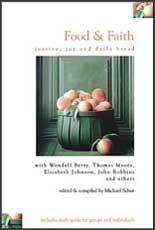Michael Schut is a teacher, writer, and speaker for Earth Ministry, which connects Christian faith with a variety of social justice issues. In this diverse and well-done anthology, he has gathered essays from Thomas Moore. Elizabeth Johnson, John Robbins, Eric Schlosser, M.F.K. Fisher, Diane Ackerman, George McGovern, Gary Snyder, and many others that probe food choices through the prism of faith. Among the topics covered are the sacramental character of food, its links to health, the family farm in peril, the human and ecological spin-offs of industrial agribusinesses, genetically modified food, and world hunger.
Schut establishes his spiritual perspective by quoting Wendell Berry:
"We can [not] live harmlessly or strictly at our own expense; we must depend upon other creatures and survive by their deaths. To live, we must daily break the body and shed the blood of creation. The point is, when we do this knowingly, lovingly, skillfully, reverently, it is a sacrament; when we do it ignorantly, greedily, clumsily, destructively, it is a desecration . . . in such desecration, we condemn ourselves to spiritual and moral loneliness, and others to want."
In a helpful study guide prepared for groups to use in a four - six week study of the paperback, Schut lays out some of the behavioral changes that can come with increased sensitivity to the ethical dimensions of food, eating, growing, buying. He describes them as the goals that led to his writing of the course:
This is an excellent resource for religious and community education programs.
